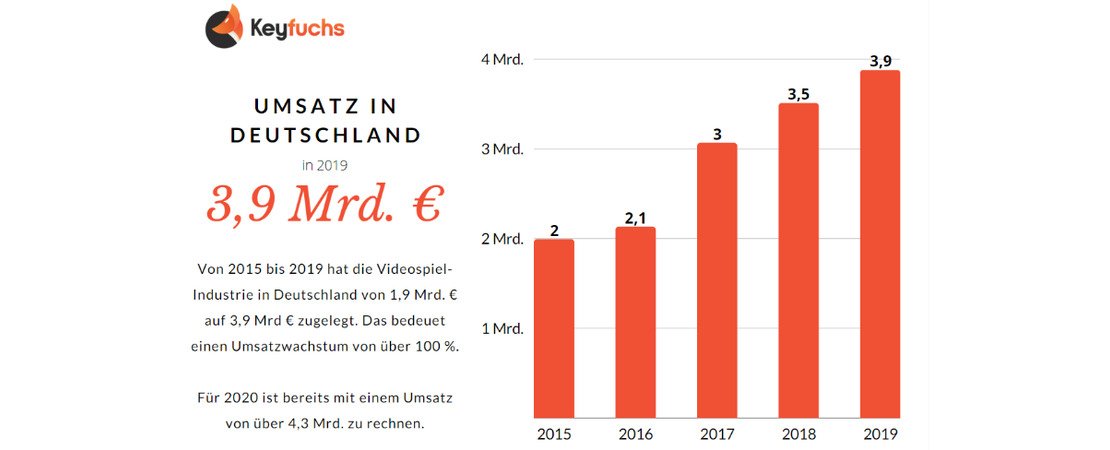The Impact of Corona on the Video Game Industry
The still ongoing Corona pandemic is having an impact on all parts of life. Everyone is affected. Everyone feels the change that seems to be unstoppable. All industries and sectors are affected by the crisis in one way or another.
We ask ourselves the questions: How is the video game industry doing? Is the industry suffering like the movie industry? Or are there perhaps even advantages and opportunities for developers and fans?
People play more than ever before!
Since the lockdown began in March, many people have spent most of their time in their own four walls. Many companies, large and small, have had to find solutions for a smooth home office. Especially in today's time this should be easier than ever before in the history of mankind.
But this switch was not the only one. Cinemas, restaurants and sports events remained cancelled for the time being. So what to do in the free time?
The solution is obvious, also for people who maybe haven't spent that much time in virtual worlds regularly before. Especially PC games are within reach for everyone thanks to Steam and Co. The delivery takes place in seconds and doesn't even require a postman, let alone a package. The home internet connection is also getting faster and the waiting time for a game is shortened rapidly as a result. It is precisely for these reasons that the video game industry is booming since the beginning of the crisis.
The revenues have already increased by 17 percent. Quarantine measures "thank you"!
In April 2020 alone, the video game industry generated a record sales of 10.5 billion dollars in the United States.
No quarter has been so sales-strong before. Never have so many people played so much

The WHO recommends video games
Who would have thought that? Maybe one or the other suspected the opposite. But the World Health Organization actually recommends that people play video games. So gaming is even health-promoting? It's not that simple. The WHO is mainly concerned that individual people do not become mentally ill through isolation from the outside world.
For this reason, the WHO started #PlayApartTogether. This is a campaign that calls on people to play online with other people and stay in touch. Because if board games and movie nights are not an option, there is always the possibility of meeting virtually.
The campaign, which is also supported by developers such as Activision Blizzard or Riot Games, lured gamers with special offers and discounts. They didn't have to be asked twice and the rush on games began.
But at the same time as the action, the WHO admonishes players and advises caution. Only last year was gaming addiction included in the ICD 11, the International Classification of Diseases.
If the gaming behavior leads to the fact that the contact to friends and family is not only neglected, but also broken off, the WHO speaks of gaming addiction. In addition, there is the neglect of other aspects of life, such as personal hygiene.
Gaming can therefore be a wonderful retreat and in times of crisis maintain and strengthen the contact to friends and family. But at the same time, everyone should take care of themselves and not lose sight of real life.

Games in Development
Similar to how it was the case with film productions until recently, most studios have also been closed. But luckily, there was no complete stop in the video game industry. Thanks to targeted solutions, a lot already works from home. Especially the aspects of story development, design, and composing a soundtrack work well from home.
Unfortunately, a smooth process is not possible in this way.
Because home computers quickly reach their limits. In addition, there is a lack of a well-developed network as is usual in the studio. Rendering and working with high-resolution content therefore becomes a problem in the home office.
The fact that the employees cannot access a large server leads to other problems. Security can no longer be guaranteed in this way.
Automatic backups and a sophisticated system as is the case with professional server systems simply do not exist in the home office. In addition, hundreds of employees have individual information on their home computers that is only brought together occasionally. This makes the whole thing more susceptible to piracy.
If codes are lying on the desk and the firewall can be bypassed more easily, the games are anything but safe.
For the development of console games, there are so-called test consoles. For this, the studios have very specific rules and guidelines.
No test console may ever leave the company and must be locked in a safe every night.
However, extraordinary situations require extraordinary measures and the employees have to take such consoles and the games under development home with them. Even this approach gives room for error.
But the constant postponement of the start date is frustrating and the makers, as well as the gamers, have a passion: stunning video games!
Do we have to expect a loss in quality for new games?
Although the industry is not completely paralyzed, the conversion of all workflows makes the whole thing much more complicated. Just the communication among employees takes time and is not always effective. Even if the process seems to be running smoothly in general, it is often the small things that ultimately decide whether a game is really well done or just good.
So it remains to be seen which hotly anticipated games will meet the expectations of the players and which will disappear into oblivion.
How are the console manufacturers doing?
It's no question that existing games will be bought. But what about the upcoming consoles? Sony announced the Playstation 5 for December 2020. Also competitor Microsoft wanted to release the Xbox Series X this year.
But what are the actual chances for the new consoles? Will there be enough devices to supply all the gamers?
Both delivery difficulties for the hardware, as well as for the peripheral devices are already leading to delays. And even if the consoles can be built in sufficient numbers and on time, there is unfortunately no Santa Claus who can deliver the world overnight. Borders must be opened and sufficient staff must be available to ensure timely delivery.
So it remains to be seen when we will actually hold the Playstation 5 and Xbox Series X in our hands.
What happened with Gamescom?
The fair in Cologne has been the largest one for video games for years.
Over 370,000 visitors go to Gamescom every year and can't wait to try out new games and look forward to the announcements of the developers.
1,100 exhibitors occupy the fairgrounds in Cologne every year and provide a lot of entertainment.

But as feared, Gamescom did not take place. At least not in this form. As with other fairs, Gamescom was celebrated in purely digital form.
The innovative middle ground shows on the one hand how inventive the industry and how unstoppable the passion of the fans and the studios is. On the other hand, it remains a compromise that comes at a heavy price.
And being there and feeling the excitement and electricity in the air is just something else entirely.
Who are the losers of the crisis?
Large companies that already have dozens and especially popular games in their repertoire are the clear winners of the crisis. But especially small companies with only a few employees have been struggling since the beginning of 2020. The production of new games is stagnating and games that are already on the market may not be well known or popular enough to generate the necessary sales.
But it hits start-ups really hard. They may have brilliant and new ideas, but they can't show anything yet. Financiers are holding back and the development of the games is on hold for the time being.
Unfortunately, as in all industries, only the very large companies can assert themselves here.
What happens after the crisis?
It is still unclear how long the world will be exposed to this exceptional situation.
We of course hope that things will soon get better again, but we cannot see into the future.
Casual players who are less at home after the crisis will also play less. In return, games that have had their release postponed will come onto the market and shake things up. Fans have been waiting a long time. They will line up and everyone will want to be the first to hold the long-awaited game in their hands.
